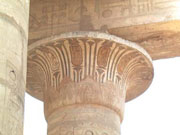INFORMATION FOR TRAVELLERS TO
SUDAN
SUDAN
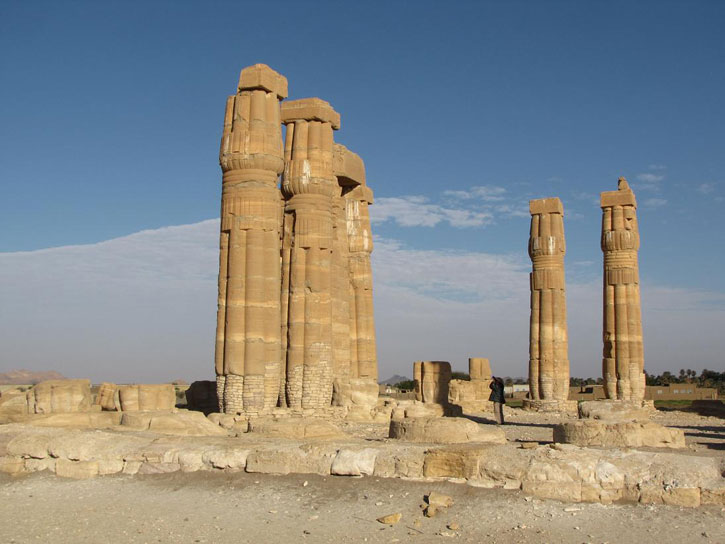 |
Welcome to 'B.C. Archaeology', the Australian tour company specialising in travel to ancient world destinations. We currently take tours to Egypt, the Sudan, Turkey, Greece, Sicily and Malta, Spain, Morocco, and Tunisia. This year we are also taking tours to Burma and Cambodia. In the future we intend to expand into ancient meso-America (Mexico, Guatemala and Belize) and also South America (Peru). The following information is provided to assist you in selecting and preparing for your holiday. The details are provided only as a general guide to help you prepare for your tour.
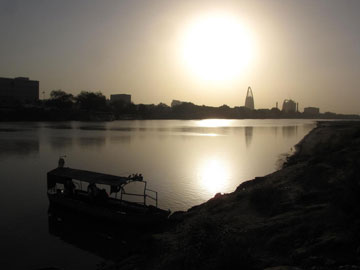 |
 |
Khartoum |
The Pyramids of Meroe |
ACCOMMODATION
In Sudan, where tourism has been limited during the past 20 years, there are few hotels outside Khartoum. Visitors to Sudan should keep in mind that some of the hotels are a little bit tired and run down - most of these older hotels are being upgraded and a few new hotels are being built to cater to the tourist trade. In Khartoum we will be staying at the Holiday Inn - this is a wonderful Edwardian Period colonial style hotel. The rooms have recently been upgraded and have good en-suite bathrooms with plenty of hot water.
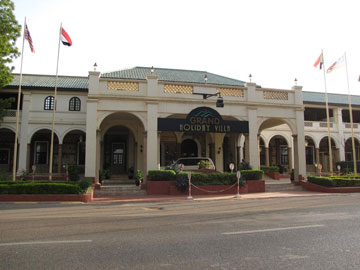 |
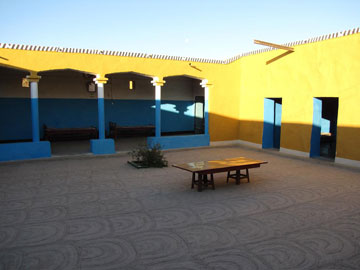 |
The Grand Holiday Inn, Khartoum |
Residential compound, Soleb |
Our accommodation is not in Western style Hotels once we leave Khartoum. In the north of the country we will be free camping in tents for a few days. These are igloo style tents which are 2 by 2 m and which can comfortably take 2 adults. We will also be given a foam mattress 2m by 60 cm which is 5 cm thick. There are water basins for washing and a cook does all our cooking. You will need to TAKE A GOOD QUALITY SLEEPING BAG - it can be cool at nights and you will need a sleeping bag.
In addition to camping while in the north we will also stay in family compounds. These are multiple room units with basic toilet facilities - most accommodation will be twin share but it may occasionally be necessary for some members of the group to share larger rooms with 4 to 6 beds.
In the small and peaceful town of Karima we are staying in a residential compound called �The Nubian House� - this is a small purpose built hotel located at the foot of Gebel Barkal. It is surrounded by a private enclosure wall with garden and lounge area. Each room is decorated in Nubian style, has its own bathroom and veranda. The complex also has a reception, restaurant and living space and has Italian management and cooks.
At Meroe, where we will be staying for a few days, our accommodation is in a permanent tented camp overlooking the pyramid site. We have 10 twin-bed tents available (4 by 4 m in size), and they are complimented by a private bathroom with shower, and toilet. Each tent is equipped with veranda and chairs to view the scenery and there is electricity from a generator until 11 pm. A communal restaurant building and lounge is available for us which has an Italian manager and cooks.
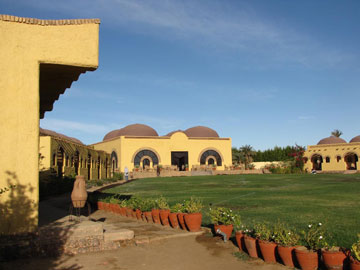 |
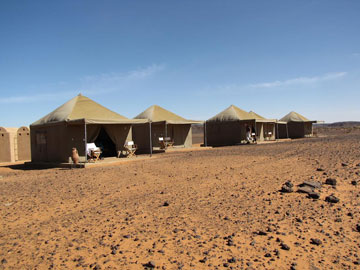 |
The Nubian Resthouse Karima |
The permanent tented camp at Meroe |
There is only limited opportunity to have a room to yourself outside Khartoum - we have a maximum of 10 rooms available for the group. The price of each tour is based on twin-share accommodation although a single supplement can be pre-arranged in a very limited number of cases (see Single Supplement below). Double beds will not generally be available except in Khartoum. The accommodation outside Khartoum is �Full Board� and covered Breakfast, Lunch and Dinner. We have cooks with us for most of the trip who provide a wide range of foods and cater for vegetarians.
CLIMATE
Sudan is in North Africa, which means that it is generally very hot and dry in the summer (June-August), warm and sunny in autumn (September-November), mild and sunny in the winter (December-February) and warm and sunny in spring (March-May). The country�s climate and weather is divided into three natural regions. The Northern part of the country, where we are travelling, is primarily a desert region; the central part of the country is mostly a grass-covered plain region known as the Savannah. The southern part of country is a vast swamp and rainy with thick rich natural forest regions. The entire drainage of the country comes from south to north through the Blue Nile, Bhar el Jebel, Sobat River, and Bahr el Ghazal that form the White Nile. The White Nile meets the Blue Nile in Khartoum and forms the main Nile River which flows through Egypt to the Mediterranean Sea.
Sudan has a range of tropical climates with many seasonal fluctuations. In the northern deserts, minimum winter temperatures range as low as 5� C at night, while maximum temperatures often exceed 44� C in summer around the vicinity of Khartoum and other northern cities and towns. Temperatures in eastern and southern parts of the country are very humid with high rainfalls almost throughout year round.
CLOTHING
Sudan is a Muslim country, and out of respect for local custom modest clothing should be worn at all times. Women, ideally, should cover the upper part of their arms, and should not wear shorts at any time. When entering a mosque, women must cover their hair and shoulders with a scarf - it is therefore worth taking one with you or buying one in the local markets. Men should wear long trousers/jeans when visiting a mosque and avoid brief shorts and singlet tops in general.
Light cotton clothing is best for travelling. Take plenty of T-shirts and light trousers. When packing, remember that you will need a heavy jacket for cool winter nights. LAYERS OF CLOTHING ARE USEFUL so that you can adjust to the increasing temperature during the day. Bring a jumper and a light jacket. It will generally be cool in the morning, warm to hot during the day, and cool to cold at night. It can be cool to cold in the north of Sudan in winter. FLAT, COMFORTABLE WALKING SHOES like sandshoes or trainers are the most appropriate foot wear for visiting the sites.
Washing can be done for you in the Khartoum hotel and at Karima. When we are free camping or staying in family compounds you will need to do your own washing. You may wish to bring washing powder to wash small items of clothing. Make sure you bring a �universal bath plug� - the hotels may not provide sink plugs or they may have gone missing. You might also like to bring a light washing line with you which can be strung up in the bathroom, or on the side of the tent, and some clothes pegs.
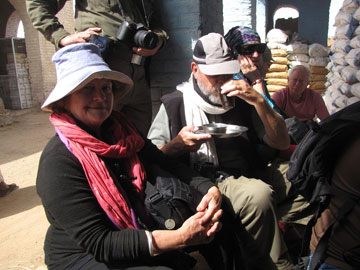 |
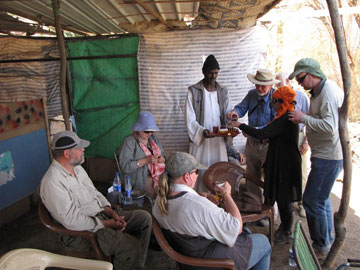 |
Light clothing best - hats essential |
Light jackets and jumpers |
Sunburn is a problem for travellers and can be avoided by wearing a hat with a broad brim and by applying plenty of sun cream. Wear long sleeved shirts in preference to short sleeved ones if you have sensitive skin. It is advised that you ALWAYS WEAR A PAIR OF SUNGLASSES when we visit archaeological sites - the sun can be very bright and there is a great deal of reflected light from the desert surface.
COMMUNICATIONS
Tourism in the Sudan is not a major industry - at the moment the Sudan gets only about 2,000 tourists a year! International telephone calls can be made from the Khartoum and Karima hotels or at government telephone offices attached to post offices. International calls in Sudan are relatively expensive. There is very good mobile coverage throughout Sudan, particularly in major centres and near the Nile Valley. It is possible to buy a cheap local SIM card and add credit using a pre-paid card.
Cyber caf�s with internet access are beginning to appear in Sudan but are not widespread. The facility is generally slow and the connection may drop out frequently. In Khartoum the service is better - the Holiday Inn in Khartoum offers paid wifi connections in the lobby using a laptop. It is also possible to buy a USB-style modem which gives access to the Internet via the mobile phone reception - this is relatively inexpensive.
ELECTRICITY
The electricity in Sudan is 230 volts / 50 Hz. In Sudan the plugs are mainly of the two-pronged European type with round section, although the hotel in Khartoum uses the old style English plugs with two horizontal prongs and one vertical one. One way around this variation is to take a universal adapter for your electrical appliances.
FILM AND CAMERAS
Film is widely available in the tourist areas and is generally reasonably priced, but you will probably get your film cheaper at home and it is thus worthwhile taking enough to last the whole trip. It may be difficult to find slide film. It is possible to get your photographs printed relatively cheaply in the Sudan but it may be better to wait until you get home if you have doubts about the quality.
Digital photography is relatively new in Sudan and it can be difficult to find places where digital photographs can be burnt onto CD�s. Therefore it is highly recommended that you take a number of flashcards (memory sticks) which can be downloaded when you get home, or you can take an MP3 or similar storage device like a laptop onto which you can download your photos.
In the Sudan there are very few restrictions about photographs in museums and at the archaeological sites - you can take photos in the museums but you should not use a flash. As in many Middle Eastern countries it is forbidden to photograph military and government instillations which are always clearly identified with signs. Never take photos of security personnel. It is polite to always ask permission before taking photographs of people - generally the Sudanese seem very happy to be photographed and always delighted to see the image on your view screen.
FITNESS
Participants should have general fitness as most tours include some walking each day - the amount of walking varies. The �B. C. Archaeology� programs are designed to be �Study Tours� and as a result we tend to spend a lot longer than the usual tour program walking around the historical sites. We sit down frequently, however, to discuss their significance. Take note that the ground is often desert surface and is often rocky and uneven.
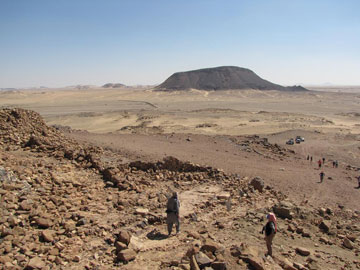 |
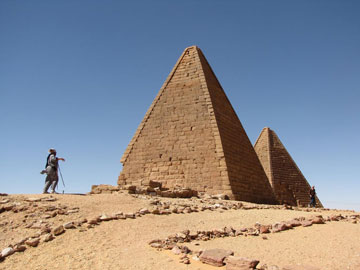 |
Exploring the Ottoman fort at the Third Cataract |
Exploring the pyramids of Jebel Barkal |
Our 4-wheel drives are not always able to arrive directly at the archaeological site we are visiting. Access to some sites involves climbing stairs, or walking across desert surfaces or some rough ground - those with mobility problems need to consider carefully whether they are capable of such activity.
FOOD
The Sudan tour operates on a �Full Board� basis except in Khartoum where the accommodation is B&B. Here the accommodation at the hotel includes an elaborate breakfast buffet with a wide selection of hot and cold dishes. In Khartoum we will stop during the day for a light lunch or snack in a local caf�. In the evening we will use inexpensive restaurants and eating places where we can sample a range of meals on an a la carte basis.
Sudanese food is fairly simple and comparable to Egyptian. In Sudan the local cuisine is slightly more bland and usually consists of rice/fries with meat and/or vegetables - kebabs are a common evening meals. It is also possible to get macaroni based dishes. Fish is also a common meal particularly Nile perch fillets with a chilli dipping sauce. Desserts include baklava and cake. Sudanese restaurants can cater for vegetarian requirements but do not expect a wide choice. A favourite dish is fuul (mashed broad beans and tahina) or felafel. A simple lunch will cost a few US dollars with a coffee or soft drink costing about $1. Evening meals are more expensive - perhaps US$20-25.
Outside Khartoum the tour operates on the basis of �Full Board�. Our accommodation includes breakfast, lunch and dinner which is prepared by a western trained cook and including Italian staff. Most days include picnic lunches due to their relative isolation. Vegetarians are well catered for.
Sudan is a totally dry country. At the moment IT IS ILLEGAL TO IMPORT OR POSSESS ALCOHOL IN SUDAN. Your luggage may be scanned and alcohol will be confiscated (so make sure you drink all your alcohol before you arrive!). It is better not to risk troubles with the local authorities.
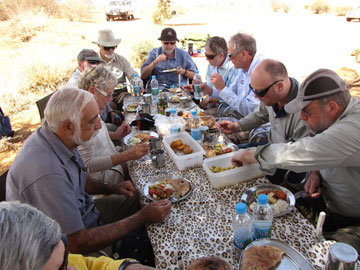 |
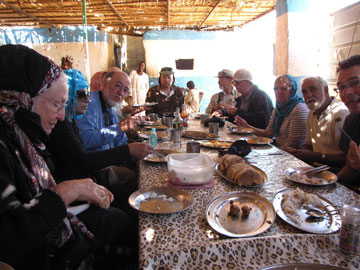 |
Picnic lunch near Naga |
Lunch in a cafe north of Khartoum |
Travellers often avoid salads while travelling but this is not really necessary, particularly as the tomatoes and cucumbers are so much better than in Australia (they actually have flavour!). It is recommended, however, that you avoid leafy salad vegetables like lettuces since these may not be washed thoroughly. Vegetables and fruit that can be peeled and washed or cooked are generally safe to eat. Food that has recently been prepared or cooked is least likely to make you ill; avoid eating food which has been kept warm for long periods.
You might like to bring some snacks with you, such as muesli bars, if you require a regular sugar fix at 11am. For lunch in Khartoum we will stop at a small caf� and have soup or salad with bread and dips such as hummus. This should cost about $10. The evening meal is usually more substantial and we would normally visit a restaurant, or eat at the hotel. Sudan offers a limited range of restaurants from inexpensive cafes to better restaurants but do not expect Western Style menus. Most meals will cost about $15-20 per person. Outside of Khartoum, the company provides a wide range of different foods including chicken, kebabs, meat balls, pasta and salads.
FREE TIME
All tours include some free time; this varies depending on the tour program. Generally we try to see as much as possible during our stay and we will often be away from the hotel between 8am and 5pm including travel time. The itinerary usually includes a free morning or afternoon every couple of days which can be used to rest or explore the local area. We also try to include one free day in the middle of the program as a total break. Evenings are usually free to relax, wander in the markets or socialise with other members of the group. In Sudan the group is encouraged to stay together when going out in the evening and may even be accompanied by a tour representative.
HEALTH
CONSULT YOUR DOCTOR FOR FURTHER ADVICE about vaccinations and additional medications that you might need while travelling to the Sudan. You should be up-to-date with Diphtheria, Tetanus, Hepatitis A, Typhoid, and Meningitis - YOU WILL NEED TO TAKE ANTI-MALARIAL MEDICATION and it is highly recommended that you take a powerful insect repellent containing DEET. Your tour leader will try to provide whatever assistance he/she can in the event of illness, but keep in mind that they are not medically trained.
Most frequently used medicines, such as Paracetamol and antibiotics are widely available over the counter in Sudan, without a prescription. Chemist shops are common but it would be advisable to bring some medicines for daily use such as pain killers, throat lozenges and plasters. If you have a special medical condition, it is recommended that you take enough of your medication to last you the length of the trip rather than trying to get the medication locally. Please advise the tour leader about any medical conditions which may affect your ability to travel (such as diabetes). Women may wish to bring their preferred feminine hygiene products as these may not be commonly available.
An upset stomach is a common complaint amongst tourists and normally passes in a day or two - it is mainly caused by the change in food and water and exposure to different bacteria and dehydration. It is useful to have basic mediation like Lomotil which can treat such problems. It is common to get a cold while travelling due to exposure to new viruses - cold and flu medication is worth taking with you as a precaution. Please remember that antibiotics are not useful for treating a cold and can actually make you feel worse by eradicating your good internal bacteria.
INSURANCE
The tour price does not include the cost of travel/health insurance. The participant must purchase this separately - no one will be permitted to travel without proof of purchase of insurance. Neither B.C. Archaeology nor Dr Michael Birrell is responsible for your health or possessions. Your insurance should cover medical and health cover for an injury or sudden illness, 24 hour emergency assistance, lost and stolen possessions cover.
MONEY
The local currency in Sudan is the Sudanese Pound - the current exchange rates can be seen at www.xe.com. The only certain opportunity to change money will be in Khartoum, either at the hotel or in our airport - it is unlikely that there will be many opportunities for exchanging money once we leave Khartoum. However, most of our services and meals are included in the program so there should be little need for local currency. Changing money in rural Sudan is time consuming and not always possible. It is therefore best to change sufficient money in Khartoum to last until one arrives back in the capital.
Cash, particularly American dollars is preferred. Tourists visiting Sudan should TAKE WITH THEM ALL THEIR REQUIRED SPENDING MONEY IN THE FORM OF CASH; preferably in American Dollars and in large denominations such as $100.00 bills. To change money in Sudan you may have to present your passport. Some larger hotels include exchange facilities where cash can be changed. A generous allowance of about $100 US dollars per day in Sudan is suggested from which you will probably bring home some change (see shopping!). Do not rely on ATM�s since they do not exist in Sudan. CREDIT CARDS CANNOT BE USED but you might like to take them with you anyway.
Traveller�s cheques in American Dollars, English pounds or Euros can be changed at a limited number of banks (they seem to be going out of fashion these days as most tourists use the ATM machine to access their own accounts). YOU MUST PRESENT THE PURCHAASE RECEIPT for your traveller�s cheques before the bank will change the cheques - it is better to keep this receipt somewhere else in the event that you lose the traveller�s cheques. Avoid taking Australian dollar traveller�s cheques as they are not widely used and may be rejected. An astronomically high commission is charged for transactions.
PASSPORTS AND VISAS
Make sure that your passport is current and that it does not expire in the six months after you are due to arrive in the Middle East - if it does, please arrange to have a new one issued before travelling. Please ensure that you do not have an Israeli visa or west bank border stamp if you are visiting Sudan - you will not be permitted to enter the country. Those with US passports may also experience difficulty entering Sudan.
The tour company will organise for entry visas for Sudan to be issued before the program departs. Visas for Sudan will be stamped into your passport upon arrival - the cost of the visas is already covered by the program. There are fees upon entering and leaving the country which will be paid by the agent.
SECURITY
Northern Sudan is a very safe region. You may see security guards at major tourist sites, and most museums may have metal detectors and bag checks.
Sudanese people are very friendly, generous and welcoming - it is not uncommon for locals to want to talk to you. In Sudan tourism is new and people are still wary of talking to foreigners. It is extremely rare that a foreigner is assaulted or robbed. If you feel uncomfortable, it is better to walk in a group.
It is always a good idea to be security conscious. It is safer to take a money-belt rather than a wallet, particularly when walking in crowded places such as markets. Try not to display large amounts of money when making purchases - take only as much money as you think you will need. Do not accept an offer on the street to change money - this has been known as a way to get your wallet out so that it can then be snatched.
Keep precious possessions, such as passports, secure in your luggage or carry them in your money belt. Make sure you have two keys for the luggage locks and keep them in separate places in the event that one set gets lost. It is worth making photocopies of your passport cover sheet, airline tickets, and credit cards - keep one copy with you in a separate place from the originals and leave another copy with someone back home in Australia.
Keep precious possessions, such as passports, digital cameras and jewellery, secure in your luggage. You must have travel insurance against loss or damage of possessions.
SINGLE SUPPLEMENT
If you are travelling on your own you can opt to share with another group member of the same gender or pay an additional fee for a room on your own. A �single supplement� normally costs $900 extra per person. There is less opportunity for single supplement outside Khartoum as the accommodation is limited to 10 or 11 �rooms� - all efforts will be made to provide it.
TIPPING
In the Sudan wages are very low in comparison with Western wages - most people, including the hotel staff you meet, earn a limited salary. Tipping is not a requirement although it is becoming more common. Always tip if someone goes out of their way to help you - you may wish to leave some change in a caf� or restaurant and many leave out a saucer for this purpose. Do not give money to beggars or children as this only encourages begging (which can be irritating and/or confronting) and is frowned upon by those who work.
The company will cover the cost of tipping hotel porters but it would be appreciated if the Sudanese guides and drivers who accompany us be given a tip at the end of the program. It is recommended that this be about $20-50 per person. More can of course be given if the guide has gone out of their way to assist you.
TOILETS
In Sudan public toilets are practically unheard of. Most archaeological sites and museums may have something approaching public washrooms however they can vary in standard. Caf� and restaurants also provide toilet facilities. It is suggested that you might carry a small packet of tissues for occasional use; antiseptic wet wipes (wet ones) or antibiotic gels can also be handy for cleaning your hands before eating.
TRANSPORT
For the international flights we will fly economy class on Etihad Airlines. There are no internal flights on our program. Most of our transport will be by 4WD which are typically Landcruisers.
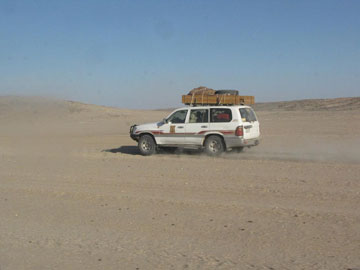 |
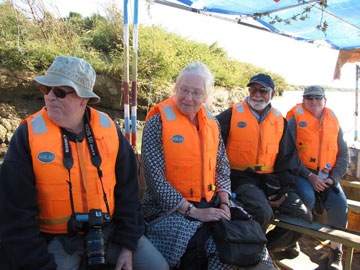 |
Touring by 4 wheel drive near Soleb |
Heading up the Nile to the 4th Cataract |
WATER
BOTTLED DRINKING WATER IS AVAILABLE AND HIGHLY RECOMMENDED. The tap water in major cities is safe to drink, but it is heavily chlorinated and more likely than the bottled water to contain bacteria that may cause an upset stomach or viruses which might give you a cold. It is safe to brush your teeth in tap water, but to be on the safe side you may prefer to use bottled water. Water in the Sudan is limited in general and we need to bear this in mind when washing and showering.
It is very easy to get dehydrated, particularly as we will be walking around archaeological sites. ALWAYS DRINK PLENTY OF WATER. Bring a small water bottle with you into which you can decant some mineral water. It is useful, but not essential, to bring re-hydration salts in the event of sunstroke.
WHAT TO BUY - AND HOW MUCH MONEY SHOULD I TAKE?
There are very few real antiques for sale and you need an export licence for the real thing. Sudan has a limited number of products such as painted ceramics, textiles, jewellery, minerals and small souvenirs. In Sudan there is a small souvenir industry - remember to leave some space in your luggage for souvenirs.
The cost of the tour covers all accommodation and most meals, transport to and entry to all archaeological sites and museums. Lunch and evening Meals in Khartoum should cost about A$20 per person and miscellaneous expenses such as water, fruit, chocolates, coffee will be additional. Depending on what you want to buy, a good estimate for total expenses is an additional US$500 per person.
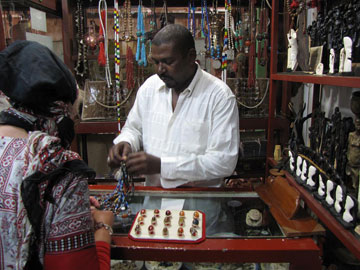 |
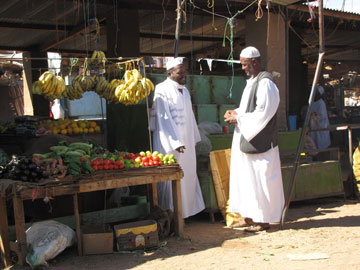 |
Khartoum markets |
The markets at Karima |
WHAT TO TAKE - SOME SUGGESTIONS
Because we are travelling by 4-wheel drive your luggage should not exceed 20 kg. One large suit case or rucksack and one small hand luggage rucksack is acceptable.
A good quality sleeping bag is essential
A light small day-pack that you can carry every day to sites
Camera and spare batteries for your camera
Additional flash cards for a digital camera
Film - it is better to bring your own and is likely to be cheaper
A hat, sunscreen and sunglasses
A small bottle for drinking water
Sensible walking shoes with flat soles
Small torch and batteries
A converter for electrical appliances - �European style� with two round prongs and �English style� three pin (or a universal adaptor)
Moisturiser cream and your familiar toiletries
Pharmaceuticals such as Panadol, throat lozenges and Lomotil
Universal plug for the sink/bath (not always provided)
A small towel to use as bath mat (not always provided)
A towel (just as a back-up - towels are usually provided in the hotels)
Washing line and pegs
Shampoo and soap, bandaids, �Wet-ones�, antibiotic gels or tissues
A mobile phone if you think this is necessary - you will need �global roaming� but remember that Sudan has poor mobile coverage
Penknife, if desired, for cutting fruit etc. Always pack it in your main luggage, not your hand luggage, when flying - otherwise it may be confiscated at the airport security.
A few small padlocks to secure your suitcases. Keep the keys in two different places in case one set gets lost.
Michael Birrell
